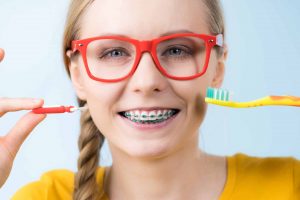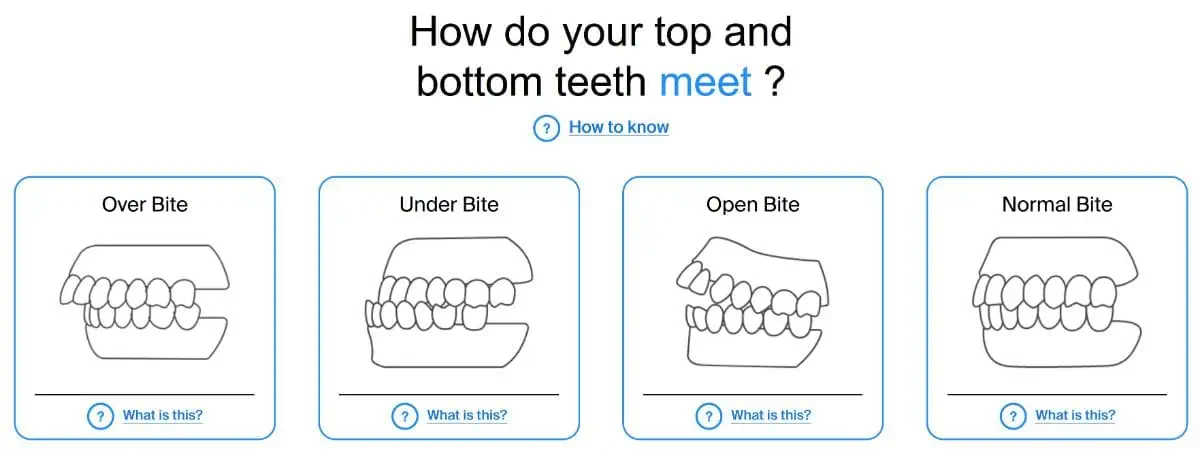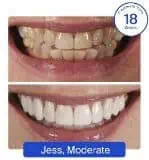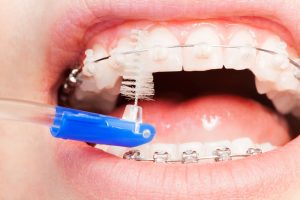When you get your new set of dental braces put on, you need to relearn how to brush your teeth with braces. Brushing your teeth may seem simple, but you may take some time to adjust to the brackets and wires that are now in the way.
If you need to learn how to properly take care of your teeth, and keep them clean with braces on, keep reading!
How do you brush your teeth with braces, step by step?
Brushing teeth with braces is similar to how you were previously brushing your teeth. However, you will want to take care and be gentle, and some types might be trickier than others to clean.
Conventional metal and ceramic braces are slightly harder to clean due to the rubber bands covering each bracket. Self-ligating braces are slightly easier to clean because they don’t have elastic bands. If you have lingual braces, you may find it a little more difficult to brush between and around the brackets and wire, as they sit on the inside of your teeth.
At first, you may have a little braces pain, so you may not want to go anywhere near them. But, it’s important that you do so that plaque and bacteria don’t build up.

An electric toothbrush is a great choice of toothbrush for braces as they are good at removing plaque and getting into slightly harder-to-reach areas behind the wires and brackets. Interdental brushes will also help with this, as well as mouthwash and floss. Regular floss may be quite difficult to use, so consider a water flosser.
How to brush your teeth with braces
- Rinse off your toothbrush and apply your favourite toothpaste.
- Hold the toothbrush at a 45-degree angle to your gum line.
- Start gently moving the brush in circular motions around your braces and teeth.
- Clean the front, back, and top of each tooth for two minutes total.
- Spend about 30 seconds properly brushing each quadrant of your mouth.
- Use an interdental brush to get in between teeth and under the archwires.
- Finally, remember to brush your tongue when you are finished. Doing so helps your breath smell clean and fresh.
- Rinse your mouth.

How to use an interdental brush
Using this little tool helps remove plaque from the wires, especially if you have trouble flossing with braces. This special brush reaches where your normal brush can’t. Here’s how to use it:
- Slide the brush gently between your brackets.
- Move the brush up and down on both sides of the brackets.
- Run the brush along the wires as you move from bracket to bracket.
- Rinse with water when you are done flossing.
- Make sure to replace the interdental brush when it starts to wear out.
Overall, many patients find using the interdental toothbrush easier than flossing, although some dentists argue that it isn’t a replacement. Either way, it can help improve your oral health.
Tips for brushing with braces
- Rinse your mouth with water first to remove loose food particles from your brackets.
- Don’t use whitening toothpaste or whitening mouthwash products. They will cause your teeth to be a different color when you have the braces taken off. If you accidentally use one of these dental products, rinse right away with water.
- Brushing and flossing is important to avoid tooth decay. Many patients use a floss threader or an interdental brush to remove plaque and food, but its worth considering a water flosser.
- Consider watching tutorial videos on “how to brush your teeth with braces”.
- Use a water flosser before brushing (after brushing it washes away the benefits of your toothpaste).
The following video shows how to brush with braces using a sonic toothbrush, interdental brushes and then a water flosser.
Vlogger Emma Louise takes us through her dental hygiene routine and shows step by step how she looks after her teeth with braces on. She explains in detail why she uses certain products, and how she personally likes to clean her braces.
Can I brush my teeth right after getting braces?
You will likely feel sensitive and uncomfortable right after getting your braces on, or after any adjustment appointments. But, it is still important that you clean your teeth and gums. You will get used to having braces on within a few days and the same can be said if you have discomfort after further appointments.
Make sure you don’t put off keeping your teeth and braces clean even when they are sensitive, or painful.
Your brackets can take 24 hours to fully adhere to your teeth, but your braces should be fine to clean after your next meal. Orthodontists use a strong adhesive, which makes it safe to eat soft food right after you leave the clinic. But, make sure you follow the specific instructions that your dentist, or orthodontist gives you regardless.
When you should brush
You won’t need to clean your teeth immediately after getting the braces on. However, you should get into the habit of brushing them after every meal and stick to a healthy dental routine as you may be wearing them for a long time.

- Treats up to 90% of Cases
- Up to 40% cheaper than Invisalign
- Buy now, pay later in interest-free instalments
- Rated 4.9/5 on Trustpilot
- As seen on 5, BBC, 4, DailyExpress, TheMail
- Get 5% OFF with our discount code DENTALY5OFF and FREE Whitening and Retainers worth £790
How many times a day should I brush my teeth with braces?
Your dentist will suggest brushing two times a day with or without braces. When it comes to orthodontics treatment, you should also clean your teeth every time you eat.
Many people choose to do the longer part of their routine in the morning to combat bad breath and get it out of the way. But, it’s important that you brush your teeth well at least twice a day with braces and after meals. And, flossing is even more important when you have braces because of the various extra places plaque and bacteria can build up.
Why you should brush two times daily
When you brush your teeth twice a day you avoid plaque build-up as well as cavities or tooth decay. Each time you brush your teeth, make sure you spend at least two minutes cleaning your teeth.
You do not want food particles to build up under your wire or brackets either. The buildup can cause tooth staining and may irritate your gums. In the worst-case scenario, the food can cause your archwire to snap. If that happens, do not wait to see your dentist or orthodontist: contact them, or emergency dental care immediately to receive assistance.
What is a good toothbrush for braces?
There is no right or wrong toothbrush for braces, as long as it has soft bristles. You can decide whether to use a traditional toothbrush or an electric one in a gentle setting. You will also need to floss between the wires, which is much easier to do with an interdental toothbrush or water flosser.
What is the interdental brush for?

The interdental brush can replace flossing your braces—not brushing your teeth. Keep in mind that you don’t need to put toothpaste on the interdental brushing tool. That’s because you do it right before or after you brush around your teeth and gums.
You will still want to floss if you can because it is essential for good gum health. Your orthodontist or dentist will give you advice on how to best do this. Check out our guide to the best Waterpik for braces — supplementing your flossing with water flossing can be a real game changer.
Can you brush your teeth the first day with braces?
Right after your orthodontics appointment, you will feel sore. However, you will still need to brush your teeth properly to remove bacteria and food from surfaces in your mouth.
If you are too tender right after leaving the practice, a good mouthwash with fluoride should suffice. That being said, you should still try to gently brush after eating or before bed.
Conclusion
It is important you start cleaning your braces as soon as you feel comfortable. The discomfort is only temporary, so make sure you clean the top and bottom rows of teeth thoroughly when you can.
You will get used to wearing braces after a week or two, and will soon be brushing your teeth with braces confidently.




